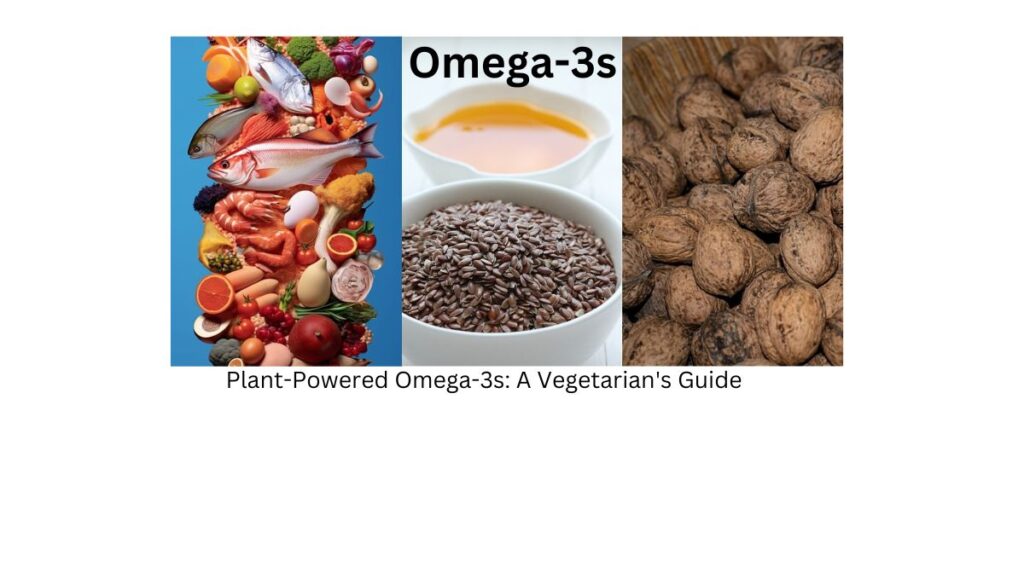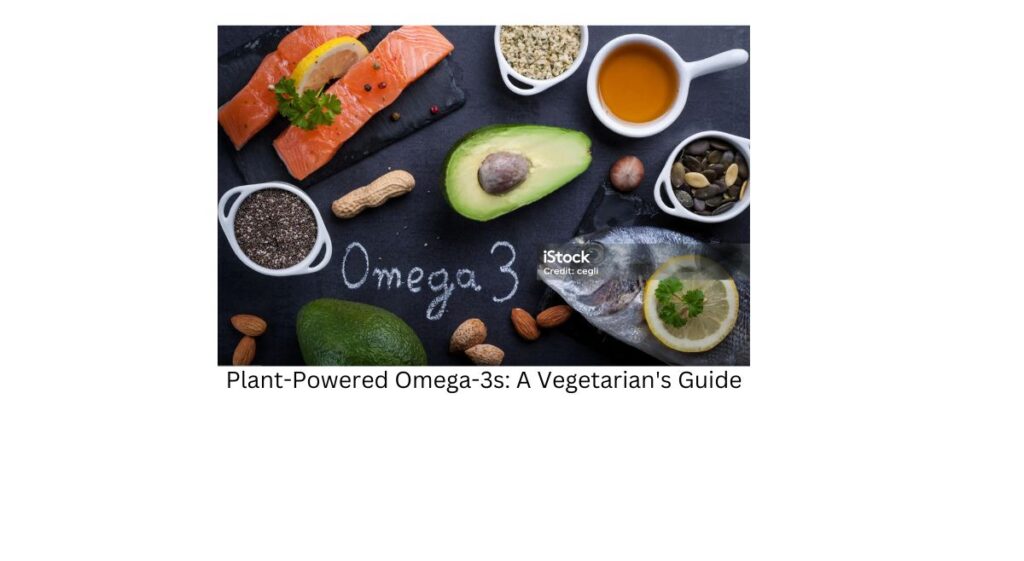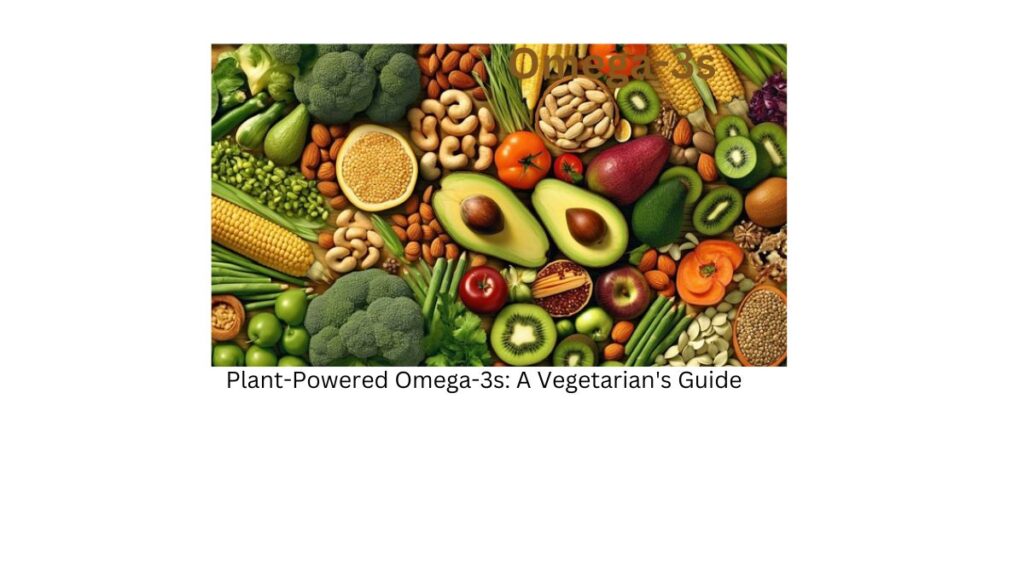Introduction:-
Plant-Powered Omega-3s: A Vegetarian’s Survival Guide

In a world dominated by fish oil, vegetarians often wonder how to obtain the essential Omega-3 fatty acids crucial for overall health. Fear not, as this survival guide is here to unravel the mysteries of plant-powered Omega-3s, providing valuable insights and practical tips for a well-balanced and nutrient-rich vegetarian lifestyle.
What are the top plant-Powered based omega-3 sources?
Plant-based omega-3 sources are rich in alpha-linolenic acid (ALA), a type of omega-3 fatty acid that the body can convert into other essential omega-3s, such as eicosapentaenoic acid (EPA) and docosahexaenoic acid (DHA). Here are some top plant-based omega-3 sources:

- Flaxseeds and Flaxseed Oil:
- Whole flaxseeds and flaxseed oil are excellent sources of ALA.
- Sprinkle ground flaxseeds on yogurt, oatmeal, or smoothies, or use flaxseed oil in salad dressings.
- Chia Seeds:
- Chia seeds are high in ALA and can be easily added to smoothies, yogurt, or used as a pudding base by mixing them with liquid.
- Hemp Seeds:
- Hemp seeds contain a good amount of ALA and are a versatile addition to salads, smoothies, or yogurt.
- Walnuts:
- Walnuts are not only a tasty snack but also a good source of ALA.
- Add walnuts to cereals, salads, or eat them on their own as a convenient and nutritious snack.
- Algal Oil:
- Algal oil is derived from algae and is a plant-based source of both DHA and EPA, the two primary omega-3s found in fish.
- Algal oil supplements are available for those who prefer a direct source of DHA and EPA.
- Seaweed and Algae:
- Certain types of seaweed and algae are rich in omega-3s, particularly DHA.
- Incorporate seaweed into salads or consume algae-based products to boost omega-3 intake.
- Brussels Sprouts:
- Brussels sprouts contain a small amount of ALA and can contribute to overall omega-3 intake.
- Include Brussels sprouts in stir-fries or roast them for a flavorful side dish.
- Soybeans and Soy Products:
- Soybeans and soy-based products like tofu and tempeh contain ALA.
- Incorporate these plant-based protein sources into your meals for added omega-3s.
- Edamame:
- Edamame, young soybeans, are a tasty and nutritious snack that provides a source of ALA.
- Canola Oil:
- Canola oil contains ALA and can be used in cooking or as a dressing for salads.
It’s important for vegetarians to include a variety of these plant-based omega-3 sources in their diet to ensure an adequate intake of ALA and support the conversion to DHA and EPA. Additionally, for those who may find it challenging to meet their omega-3 needs through food alone, algal oil supplements offer a convenient and effective alternative.
Why is Omega 3 necessary for a vegetarian person?
Omega-3 fatty acids are essential for everyone, including vegetarians, due to their crucial roles in supporting overall health and well-being. While Omega-3s are commonly associated with fish oil, vegetarians can obtain these essential fatty acids from plant-based sources. Here are several reasons why Omega-3s are necessary for a vegetarian person:

- Heart Health:
- Omega-3s have been linked to cardiovascular health by helping to reduce the risk of heart disease.
- They contribute to lowering blood pressure, reducing triglycerides, and maintaining healthy cholesterol levels.
- Brain Function:
- Omega-3s, particularly DHA (docosahexaenoic acid), play a vital role in brain development and function.
- They are essential for maintaining cognitive function and may contribute to a lower risk of cognitive decline as one ages.
- Inflammation Reduction:
- Omega-3s have anti-inflammatory properties that can help reduce chronic inflammation in the body.
- Chronic inflammation is associated with various diseases, and Omega-3s may contribute to managing inflammatory conditions.
- Joint Health:
- Omega-3s may support joint health by reducing inflammation and alleviating symptoms in conditions like arthritis.
- They can contribute to improved joint flexibility and decreased stiffness.
- Eye Health:
- DHA, a type of Omega-3, is a major component of the retina, and a sufficient intake is essential for maintaining good eyesight.
- Omega-3s may help prevent age-related macular degeneration and other eye-related issues.
- Mood and Mental Health:
- Omega-3s are linked to mood regulation and mental health, potentially playing a role in reducing symptoms of depression and anxiety.
- They contribute to the structural integrity of cell membranes in the brain.
- Pregnancy and Infant Development:
- Omega-3s, especially DHA, are crucial during pregnancy for the development of the baby’s brain and eyes.
- They are often recommended for pregnant women to support fetal growth and development.
- Immune System Support:
- Omega-3s can modulate the immune response, helping the immune system function optimally.
- They may contribute to a reduced risk of chronic diseases by supporting a well-balanced immune system.
For vegetarians, obtaining Omega-3s from plant-based sources such as flaxseeds, chia seeds, hemp seeds, walnuts, and algae-based supplements is essential to ensure they receive the health benefits associated with these vital fatty acids. Integrating these sources into a well-balanced vegetarian diet contributes to overall health and helps meet the specific nutritional needs of individuals following a plant-based lifestyle.
How can vegetarians overcome common challenges in ensuring an adequate intake of Omega-3s, especially when faced with situations like dining out, traveling, or managing dietary restrictions?
Here are some practical tips for vegetarians to overcome common challenges and ensure an adequate intake of Omega-3s in various situations:

- Dining Out:
- Choose restaurants that offer vegetarian options rich in Omega-3s, such as salads with flaxseeds or chia seeds, vegetable stir-fries with walnuts, or dishes incorporating algae-based ingredients.
- Communicate dietary preferences to the server to ensure your meal aligns with vegetarian choices that are high in Omega-3s.
- Traveling:
- Pack portable snacks like individual portions of nuts, seeds, and trail mix to have a convenient source of Omega-3s while on the go.
- Research vegetarian-friendly restaurants at your travel destination in advance and plan your meals to include Omega-3-rich options.
- Managing Dietary Restrictions:
- Explore a variety of plant-based Omega-3 sources to diversify your intake. Incorporate foods like flaxseeds, chia seeds, hemp seeds, and algae-based products into your diet.
- Consider using plant-based Omega-3 supplements, such as algal oil capsules, to ensure you meet your nutritional needs.
- Meal Preparation:
- Prepare homemade meals with Omega-3-rich ingredients. For example, add flaxseeds or chia seeds to smoothies, salads, or oatmeal.
- Experiment with vegetarian recipes that incorporate walnuts, hemp seeds, and other plant-based sources of Omega-3s.
- Stay Informed:
- Keep yourself informed about vegetarian-friendly Omega-3 sources and their nutritional benefits.
- Read food labels to identify products fortified with Omega-3s or containing plant-based oils like flaxseed oil or canola oil.
- Connect with the Vegetarian Community:
- Join vegetarian forums or communities to share tips and recommendations with like-minded individuals.
- Exchange experiences and learn from others who have successfully navigated similar challenges.
- Consult a Dietitian:
- Seek advice from a registered dietitian or nutritionist to create a personalized plan that ensures you are meeting your Omega-3 requirements.
- Discuss any specific dietary restrictions or preferences to tailor recommendations to your individual needs.
By proactively addressing challenges and incorporating these tips into your lifestyle, vegetarians can overcome obstacles related to obtaining sufficient Omega-3s, making it easier to maintain a healthy and balanced diet.
Conclusion:
Wrap up the guide by emphasizing the importance of plant-powered Omega-3s for vegetarians and reiterating the diverse options available. Encourage readers to embrace these dietary changes for long-term health benefits, and provide a call-to-action for incorporating these strategies into their daily lives.
https://youtu.be/BTXik0UUIT0?si=oVvq1CrAKoxMTJiD





